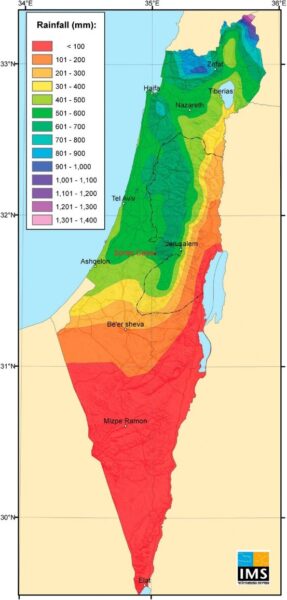By Edem Kofi YEVUTSEY
Ghana is facing its worst drought in decades, affecting close to a million small-scale farmers across the northern parts of the country and with devastating consequences for food security. Crucial staple crops such as maize, rice, and yam are being heavily impacted, leading to significant economic losses estimated at GH¢3.5 billion in investments and GH¢10.4 billion in lost revenue.
Given that Ghana’s agriculture is predominantly rain-fed, the country remains vulnerable to climate extremes, especially droughts. As a matter of fact, Ghana has a history of dry spells, with one of the most notable being the 1982/83 drought which resulted in widespread famine.
Ghana’s intermittent encounters with drought and water scarcity is an ever-present situation in Israel, a country which is one of the driest in the world. More than half of Israel is a desert with annual rainfall in the southern part of Israel less than 100mm while annual rainfall in the middle belt of Israel is between 100-200mm. Comparatively, the driest region in Ghana is the Greater Accra Region which received 514mm of precipitation in 2021.
The Northern, North-East, Savannah, Upper West and Upper East Regions of Ghana which are also considered dry regions by Ghanaian standard received on average more than 1000mm of precipitation in the same year. Ghana is therefore far from the desert that Israel is.

Israel has, as a matter of necessity, developed technologies for managing its water scarcity while developing its agriculture under these challenging conditions. Israel’s vast experience in farming under arid conditions offers promising solutions that could help Ghana mitigate the effects of drought and secure its agricultural productivity.
Here are some Israeli solutions that could be a game-changer for drought mitigation in Ghana.
Drip Irrigation: Israeli companies like Netafim pioneered the drip irrigation technology, which delivers water directly to the roots of crops, minimizing water waste and maximizing efficiency. Israel’s N-Drip has pioneered the world’s first micro irrigation solution powered by gravity. N-Drip’s system deliver precise irrigation that uses as little water as possible to provide higher yields without requiring additional energy or filtration. These systems could revolutionize farming in Ghana’s drought-affected regions by ensuring that the scarce water available is used effectively.
Wastewater recycling: Israel leads the world in wastewater recycling; treating and reusing up to 86percent of its wastewater for agricultural purposes. Israel’s Shafdan Wastewater Treatment Plant for instance, treats municipal wastewater from the Tel Aviv area and then transports the treated effluents through pipes to irrigate farms in the Negev Desert. Israel’s expertise in wastewater treatment and reuse could provide a sustainable water source for agriculture in Ghana, reducing reliance on unpredictable rainfall and conserving fresh water for other essential uses.
Precision agriculture: Tools such as AI-based sensors, developed by Israeli companies like SupPlant, enable real-time monitoring of soil moisture, plant health, and weather conditions. With limited resources such as water, land, fertilizers, pesticides and energy, precision agriculture is the fulcrum of all solutions promoting sustainable agriculture because it ensures that only the optimal amounts of resources are used at the points where they are needed, at the exact times they are needed. Precision agriculture ensures that farmers remain productive under challenging environmental conditions.
Greenhouse farming: Greenhouse farming has become the primary method of farming in Israel, allowing farmers to grow crops in controlled environments, optimizing water use and protecting plants from external climate factors. Greenhouse farming also ensure the minimal use of plan protection chemicals, thereby reducing cost and the release of harmful chemicals into the environment. Israel has become a world leader in the technology of Greenhouse farming which could help Ghanaian farmers extend the growing season and maintain productivity, even during periods of drought.
By adopting Israeli agri-tech innovations, Ghana can build resilience against future droughts. Technologies such as drip irrigation, wastewater recycling, and precision farming are crucial not only for overcoming the current crisis but also for establishing long-term sustainability in the agricultural sector. As Ghana seeks to safeguard its food security and support its farmers, leveraging Israeli expertise could be a vital step toward securing livelihoods and preventing future drought-induced food crises.
>>>the writer is the General Secretary, Ghana Israel Business Chamber










